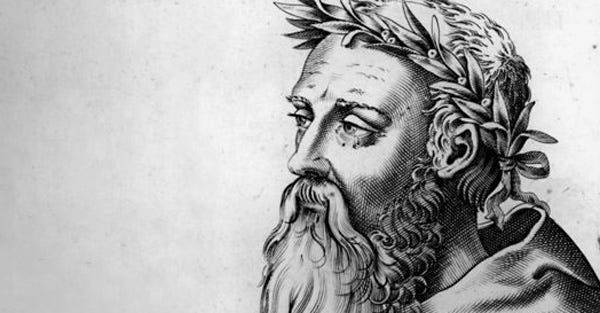The Past: Heraclitus
Hey friends,
If you missed the discussion about opinion and belief then you can find it here. I look forward to discussing what we should do in the face of human affairs this Friday.
If you have any friends that you think would love these emails then please forward it to them! It would mean the world for more people to take part in Friday discussions.
Enjoy this week’s thinker!
Heraclitus was a pre-Socratic philosopher who lived around 550BC in Ancient Greece. He is interesting to us because he influenced Plato and Aristotle (and subsequently the whole of Western philosophy).
Unfortunately, everyone struggles to understand what he was trying to say. He wrote in paradoxical aphorisms and riddles. He even gained the nickname “the riddler” because of this.
“what I understood of Heraclitus’s book was fine, and no doubt also what I didn't understand, but it needs a diver to get to the bottom of it.” - Socrates
It is thought that he intentionally shrouded his ideas in obscurity which is just great. He thought that everything of value must be obtained through hard work and clearly valued his writing very highly.
“All things come out of the One and the One out of all things. ... I see nothing but Becoming.” - Heraclitus
At times his writing makes no sense. He started a rather annoying philosophical tradition. But the ideas that I was able to understand are timely and relevant even today.
Be yourself
Heraclitus could definitely be described as someone who hated humanity. He thought that most men are useless and ignorant conformists.
“It is a waste of time paying any attention to the vantur of the masses. Just as it is useless to attend to the noises of sheep. It is only the rare and unique individual that has any worth” - Heraclitus
He rated the efforts of one person doing their own thing as better than the combined efforts of 10,000 who are just mindlessly conforming. Heraclitus wants us to be unique. To be ourselves.
He got so annoyed at what his fellow Greeks were doing that he left the city and wandered the mountains making his diet of grass and herbs. But after a little thought - maybe he had a point.
The way that we can provide the most value in our lives is not by doing the same thing as everyone else. Someone else could probably be doing that thing better than you.
The way that you provide the most value is by doing the thing that only you could do. That way you can provide a service or make art that is unique and that will increase its value.
Maybe Heraclitus’s anger was simply because the Greeks were not finding their voices and therefore missing out on their great potential.
There is more to the world than your perception
The greatest contribution that Heraclitus had to philosophy is his idea of Logos. Logos is the common truth that exists everywhere and structures reality. You might call it the objective reality that exists independent of experience.
Even though Logos is common he thought that most individuals were too dim-witted to understand it. He thought that most people live in their own petty and constricted reality tunnel. Yep, more dislike of other people…
He thought that too many of us perceive the world through our own illusory beliefs, our desires, our insecurities and our opinions. They end up shaping our reality so much that we lose sight of the common reality that exists.
I tend to agree with Heraclitus here - wouldn’t the world be so much better if we realised that our perception is just a perspective.
Heraclitus thinks our take on the cosmos or our perspective is influenced by many variables and is, therefore, relative to many variables like geography, time and psychological state.
Others might have a different perspective. And our perspective is not what really exists as it is only one version of the Logos.
You can’t just be taught everything
Ironically, he thought that you can’t just listen to a philosopher or study to find out the truth. He thought that you have to see the truth through your own eyes. The truth must be experienced.
This is an interesting distinction to make and one that I find very compelling. Heraclitus is arguing that some things can be taught and some things that simply cannot.
For Heraclitus, the fact that there is a common truth is not something that can be taught but must be experienced. This is different from a statement like 1+1=2 which can be taught.
The same can be said of other facts. For example, knowing that you are going to die is a visceral experience and also a plain and boring fact about humans. Knowing that poverty is a global problem is different from knowing what it’s like to live in poverty.
There is more to experiencing life than what you can be taught.
Heraclitus has been nicknamed “the weeping philosopher”, in contrast to Democritus, “the laughing philosopher”. These are the two archetypical views of human affairs and have been based on the two ancient philosophers.
Should we be laughing or crying at humanity and the human condition?
Referenced in this piece: Aristotle: 3 Habits That Will Help You Flourish
Thanks for reading, it means a lot. It takes a while to research and write these newsletters so please make sure two people you like see it. Make sure they benefit from my research too!
Take care, stay safe.
Jack.


